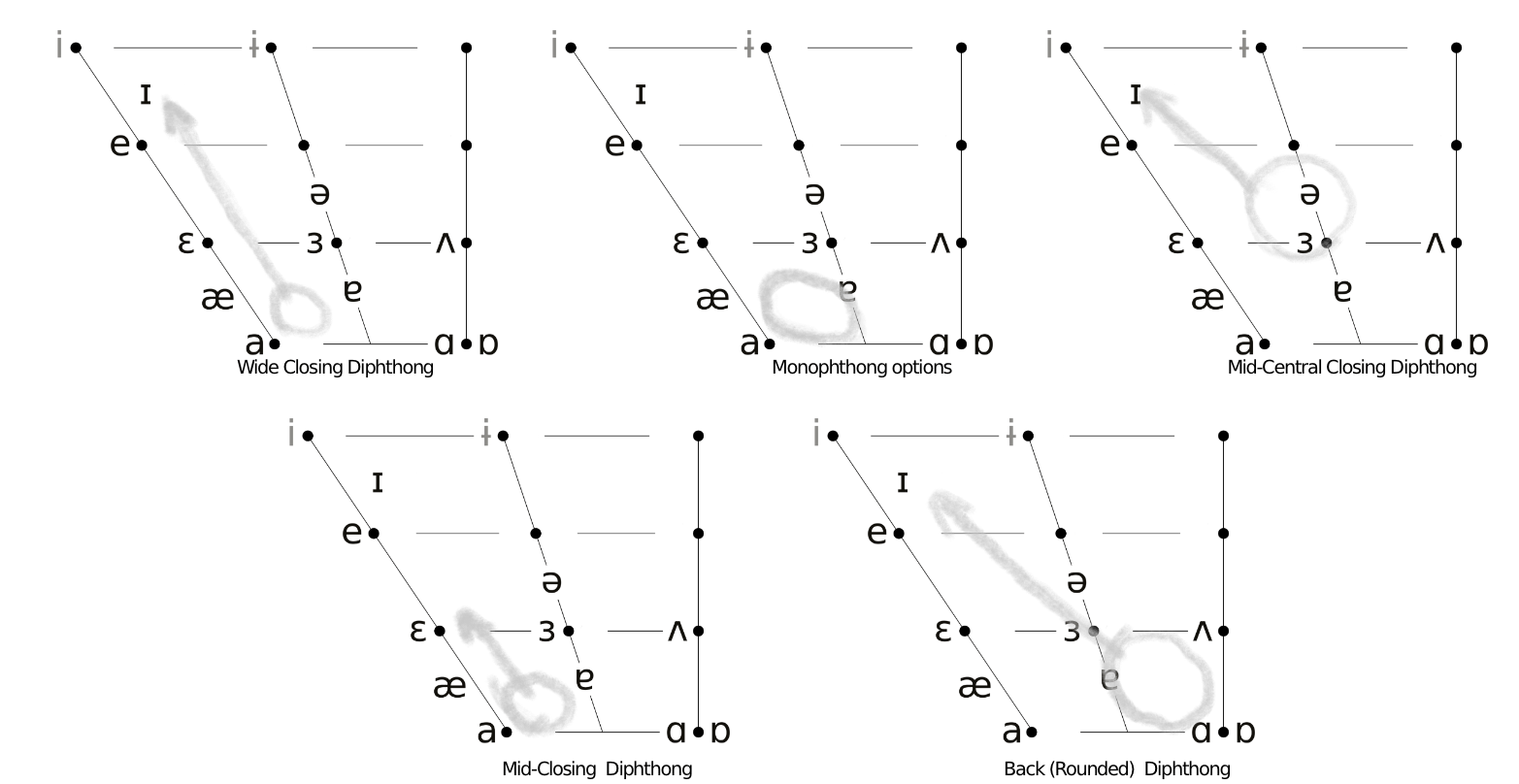15 The PRICE Lexical Set
A Closing Diphthong goes from wherever the nucleus starts to a close coda. The most common type of price is a wide closing diphthong, where the nucleus of the diphthong is open [a ~ ɑ], which then off-glides towards [ɪ̯], so we have [aɪ̯ ~ a̠ɪ̯ ~ ɑ̟ɪ̯ ~ ɑɪ̯]. There are many other variants for price, with as many as five alternate options, depending on how you count them. These include the well-known monophthong version [a] heard in accents of the US South; mid-centralized versions like [əɪ̯] heard in parts of the South of England, which contrasts with the back and sometimes rounded versions (like [ɒɪ̯]) which one might hear there in more urban speech; and finally a diphthong with a mid-front offglide, [ae̯ ~ aɛ̯], as one might hear in Manchester or Leeds. And then there are accents with allophonic variations, that have one version of price before a voiceless consonant, a different version before a voiced consonant (sometimes called pride or prize), and, rarely, a third version at the end of a morpheme or word (sometimes called pried or pry).

price can be in both Free and Checked syllables, both stressed and unstressed. Many price vowels in unstressed syllables are the result of compound words, such as website, guideline, highlight, or suffixes like -side as in outside, seaside or poolside.
- 🕊Free: does not require a following consonant, and can exist on its own, e.g. I, eye
 Frequently a front closing diphthong, though it can be a monophthong
Frequently a front closing diphthong, though it can be a monophthong- in stressed and unstressed syllables
Spellings
Wells, in devising the price Lexical Set, created two subgroups that correspond to spellings; those spellings relate to historical pronunciations, though there are very few accents that differentiate these two versions today (and they’re almost exclusively in Scotland). Basically, Group Ⓑ are words that had price followed by the consonant /x/ back in the days of Middle English, and all of the words that take that have ‹ig› in their spelling.
price Ⓐ: ‹iCe, ie, i, y›, as in nice, pie, find, by
price Ⓑ: ‹igh, ign›, as in right, high, sign
As someone from a country where many people have an allophone for price before a voiceless consonant, and a different vowel quality at the end of a word or when followed by voiced consonant, I certainly understand the argument for differentiating the 3 sub-groups, which some define by using the keywords price, prize, and pry. However, re-using the price keyword to represent only one third of the price lexical set seems very confusing. Using alternate keywords, like tight / tide / tied, is probably a better choice.
Pronunciations
Across all accents, the nucleus of the price lexical set is pronounced with a broad range of vowels, either rounded [ɔ ~ ɒ], or unrounded and more open [a ~ ɑ ], or unrounded and more medial [ʌ ~ ə ~ ɐ]. price generally features an offglide towards /j/, typically [ɪ̯], and sometimes with more closure—what I call more “bite,” as if you’re biting down on the diphthong—towards [i̯]. There are also variants with “less bite,” that offglide to [e ~ ɛ]. And, as we’ve already discussed, variants that have no “bite” (offglide) at all, whose nucleus is usually in the realm of [a ~ a̠ ~ ɑ̟ ~ ɑ].
The nucleus of price is usually more advanced than the nucleus of mouth, but not always. In cases where price’s nucleus is back and mouth’s is front, as we find in London, New Jersey and Philadelphia accents, we have the price–mouth Crossover, as Wells dubbed it.
There are many accents—primarily in the US South—where price is a monophthong in all settings, and its quality is typically in the area of [a ~ ɑ̟]. There are also many more US accents, both in the South and in the Midlands, that also have monophthong price, but not in all settings; typically they have the monophthong in free syllables, or when followed by a voiced consonant. In the Midlands, they only have price monophthonging before /m, n, l, r/. When these accents don’t have the price monophthong, they have the fairly familiar [aɪ̯] diphthong.
Canadian Raising is a subvariant of price before voiceless consonants, where the nucleus is “raised” towards a mid-central vowel, and the offglide is also a little more close: tight is [əi̯], as in might, site, knife; in all other settings, tie/tide is [aɪ̯] as in my, side, knives. So-Called Canadian Raising doesn’t happen exclusively in Canada: Virginia, coastal South Carolina, Philadelphia, Eastern New England and The US North also have this feature.
Since 1600, almost all accents have had a merger of price Ⓐ and Ⓑ. In fact, the traditional dialects of Scotland and Northern England that differentiate these two do so only in terms of length—the vowel quality for both sub-sets is /i/:
price Ⓐ die [diː]
price Ⓑ right [ɹit]
In more contemporary Scottish and Northern Irish accents, the allophonic variants are very complicated to explain. The first variant is in tie, which is in syllables that are “free”, that lack a final consonant, which are [ae̯]. So tie, sigh, and tied, sighed, are tie, but not tide, side, or tiɡht, sight=site, which are tide/tight: [ʌi̯]. To further complicate matters, tie [ae̯] here includes syllables ending in voiced fricatives or /r/, such as tithe, rise, hive, fire.
Personal Pronunciation: Articulation Options
First let’s identify whether you have a monophthong, a diphthong, or possibly both. Say the following words slowly, and try to feel/hear whether your price vowel moves in a closing direction (up and forward): high, die, find, style, night, like.
Note that the diphthong is a movement of the tongue, a closing by raising the middle of your tongue up toward the roof of your mouth. If you do have a monophthong, it is less likely to happen in a word with a voiceless consonant following the vowel, as in like or night , than in a syllable where the price vowel is at the end of a syllable/word, as in die or high, or when followed by a voiced consonant, as in find or style.
These is one other check we should do here: do you have Canadian Raising, whether you’re Canadian or not, where price before a voiceless consonant is raised to [əi̯]? This is quite common in many parts of North America. Let’s check—compare these minimal pairs:
+ voiceless C/ + voiced C: tripe/tribe, right/ride, light/lied, advice/advise, rice/rise, rifle/rival
 The former will likely be significantly shorter than the latter. Here is an occasion where a recording might make it easier to discern the vowel quality of the two settings, and/or whether you have a diphthong or a monophthong on such a short vowel sound; a spectrogram might make it even easier, though you would want to be sure to speak both words on the same pitch, so that that doesn’t distract you from hearing whether there is a change in vowel quality.
The former will likely be significantly shorter than the latter. Here is an occasion where a recording might make it easier to discern the vowel quality of the two settings, and/or whether you have a diphthong or a monophthong on such a short vowel sound; a spectrogram might make it even easier, though you would want to be sure to speak both words on the same pitch, so that that doesn’t distract you from hearing whether there is a change in vowel quality.
 Perhaps a simpler and more accessible option would be to video your mouth (or look in a mirror!) as you say these pairs: can you see your mouth closing, your tongue raising more on the first item in these pairs?
Perhaps a simpler and more accessible option would be to video your mouth (or look in a mirror!) as you say these pairs: can you see your mouth closing, your tongue raising more on the first item in these pairs?
Monophthong or Closing Diphthong: Now that we’ve figured out whether you have a diphthong or a monophthong, let’s try to figure out what the specific vowel quality of your price monophthong, or the nucleus of your diphthong could be. Begin by exploring the pronoun we use for ourselves: I. If it’s a diphthong, lengthen the nucleus, the beginning of the diphthong; if it’s a monophthong, just hang out there for a moment. If your pitch drops as you say it, it can help to intone the sound on one “note” or pitch so you don’t get distracted by the change of melody. You could use a word like buy, or repeat the words above. Use an audio or video recorder to experiment on your own, or work with a coach, teacher, classmate or friend to identify how your price compares with someone else’s price. Next, subtly shift the beginning of price around in your vowel space (your mouth!) in tiny steps —up, forwards, down, and back—before rising up to your offglide if you have one. You should feel the top surface of the middle of your tongue moving delicately up and down as you experiment while keeping your tongue tip behind your lower front teeth. (There are more nerves at the front of the tongue, so it may be a little easier to figure out what’s going on here than on a back phoneme like goat or thought.) Notice how your tongue moves towards/away from your hard palate/velum and alveolar ridge, making more or less space near the front of your mouth.
Back (and Rounded?) variation: Explore the vertical dimension with your lips rounding forward, from an unrounded [ɑ], or a rounded [ɑ̹], sliding through either unrounded [ɑ̞, ɑ, ɑ̝, ʌ̞, ʌ, ʌ̝], or rounded [ɑ̹, ɒ̞, ɒ, ɒ̝, ɔ̞, ɔ, ɔ̝], etc., slowly moving higher and more close: can you find a starting place that matches your speech? Once you’ve locked onto it, rock up and down, above and below, more close, more open. Is this your starting spot? Compare price with rounded thought and lot (how do tight/tied sound when followed by taut and tot?), and see how great the contrast is between the nuclei of these vowel sounds.
Unrounded Central variation: with your lips relaxed, explore the vertical dimension from [ə], sliding up towards [ə̝, ɘ̞, ɘ, ɘ̝, ɨ̞, ɨ, ɨ̝], slowly moving higher and more close. Then explore going lower, sliding down towards [ə̞, ɜ̝, ɜ, ɜ̞, ɐ̝, ɐ, ɐ̞], slowly moving lower and more open.Try to find where your price sound begins. Once you’re sure of where it is, shift the value of it up and down very slightly, above and below, more open, more close. Be confident in where yours is and isn’t. Compare price with unrounded strut and nurse (compare bite with butt and Bert), and with rounded thought and lot (compare tight/tied with taut and tot ), and see how great the contrast is between the nuclei of these vowel sounds.
Offglide: Let’s turn our attention to the offglide, if you’ve got one. Where does price end? Due to the reduced quality of the offglide, which tends to be quieter, this is much harder to ascertain than the nucleus. When speakers focus on their offglide they often over-emphasize it; when they are being more emphatic, they may resort to a more extreme articulation of the offglide, and in distorting it, could easily miss the true nature of its vowel quality.
 It might be worth recording some words, such as fiber, ride, prize, hive, (or pipe, right, price, life if you only have the diphthong before voiceless consonants) at regular speed and then using software (such as the free Audacity app and the “Effect>Change Tempo…” menu item) to slow down the word in order to hear what’s going on. It’s always best to put the word you’re exploring in the middle of a phrase when you do this, as words at the beginning or end of a phrase can be affected by prosodic effects. Something like “The word ____ is interesting” should get you an undistorted pronunciation.
It might be worth recording some words, such as fiber, ride, prize, hive, (or pipe, right, price, life if you only have the diphthong before voiceless consonants) at regular speed and then using software (such as the free Audacity app and the “Effect>Change Tempo…” menu item) to slow down the word in order to hear what’s going on. It’s always best to put the word you’re exploring in the middle of a phrase when you do this, as words at the beginning or end of a phrase can be affected by prosodic effects. Something like “The word ____ is interesting” should get you an undistorted pronunciation.
For closing diphthongs, this vowel will be quite close, in the range of [ɪ], [i], or [ɨ]. In some accents, the offglide is forward, usually around [e] or [ɛ].
Transcribing price: Decide which vowel symbol best suits the nucleus of price in your speech:
If your price nucleus is… (use whichever vowel symbol is appropriate for you)
- high, use the raised diacritic [ a̝ ], a small T pointing up
- open, use the lowered diacritic [ a̞ ], a small T pointing down
- pushed forward, use the advanced diacritic [ ɑ̟ ], a tiny plus sign +
- pulled back, use the retracted diacritic [ a̠ ], a tiny minus sign –
- having only minimal lip-rounding, use the unrounded diacritic on a normally rounded symbol [ɒ̜] or the rounded diacritic on a normally unrounded one [ɑ̹]
If you have a closing price diphthong, your coda/offglide will likely be unrounded
- close front, so use a lower-case i, [ i̯ ]
- near-close near-front, so use a small-cap i [ ɪ̯ ]
- close central, so use a lower-case barred i, [ɨ̯]
- mid-close front, so use a lowercase e, [e̯]
- mid-open front, so use an epsilon ɛ, [ɛ̯]
Alternate Pronunciations
Experiment with the price Word Lists, Phrases and Sentences with the following price options:
As you move the vowels in these directions, see whether that modified oral posture might inspire you to move the articulation of consonants and other vowels in the word in similar ways. Does it remind you of an accent other than your own?
Word Lists for price in a Free Syllable, at the end of a word
KEY: ◾︎ price in stressed syllable ◽︎ price in unstressed syllable
Word Lists for price in a Free Syllable, followed by comma (schwa)
KEY: ◾︎ price in stressed syllable ◽︎ price in unstressed syllable
Word Lists for price in a Free Syllable, followed by letter (schwa+r)
KEY: ◾︎ price in stressed syllable ◽︎ price in unstressed syllable
Word Lists for price, sorted by the consonant that follows
KEY: ◾︎ price in stressed syllable ◽︎ price in unstressed syllable
PLOSIVES
-p
-b
-t
-d
-k
-ɡ
AFFRICATES
-tʃ
-dʒ
NASALS
-m
-n
-ŋ
FRICATIVES
-θ
-ð
-f
-v
-s
-z
-ʃ
-ʒ
-l/ɫ
-ɹ
-j
-w
Short Phrases
- High and dry.
- In spite of myself.
- The spice of life.
- Fine Key lime pie.
- A bright night light.
- Your guide to Fine Dining .
- Your final lifeline.
- Wild Mountain Thyme was on Prime.
- White twisted nylon fishing twine.
- Shiny Twilight vampires.
- Monty Python’s The Life of Brian.
- The Siamese cat had five lives left, not nine.
- An exciting, high-profile client.
- My Giant Tiger flyer arrived.
- I’d like to try a light white wine.

Sentences
Level 1
Short with 2-3 words, underlined
- Try the spicey rice dish .
- An investor from China financed the new winery.
- The minority* leader is dynamic.
- They prescribed nitroglycerin for angina.
- We invited an exciting playwright to speak.
Level 2
Short with 4-5 words, underlined
- Cairo will ride the non-binary float at Pride!
- The price for pineapple upside-down cake is nine dollars.
- What’s the climate in Kanai, Nigeria like?
- Whose bright idea was it to recycle my iPhone?
- Ryder and Piper picked dandelions for the librarian.
Level 3
Medium with 3-4 words, not underlined
- Wyatt Earp arrived in the mining town of Tombstone in 1879.
- Mariah tried Ribena in Brighton.
- Riley served appetizers and spiced cider to their friend.
- We planted iris, weigela and hydrangeas near the lilac bushes.
- The land of the midnight sun is the arctic, where the sun shines all night long in summer.
Level 4
Hard with 4-6 words, not underlined
- The Tigris River inside Baghdad is polluted at rates much higher than is hygienic.
- On Fridays Cadhla [ˈkaɪ̯lə] drives to Sligo in her Hyundai*.
- They hope to clarify the timeline for decline due to Alzheimer’s.
- Only two Taiwanese spiders have bites you could die from.
- The spiteful private defiantly justified his unverified denial at his trial.
Mergers
price–choice (Bile-Boil or Line-Loin) Merger: price and choice are merged in some varieties of English—known colloquially as the line–loin or bile-boil merger—as heard in part of the South of England, Ireland, the Caribbean, and Newfoundland. In many of these cases, price and choice are pronounced with a pronunciation that is shaped beginning in the middle of the mouth and offgliding to [ɪ̯], e.g. [əɪ̯]. Other options for the nucleus are [a] and [ɑ].
If you have this merger, then try to differentiate the price from mouth words in this sentence by rounding mouth’s offglide to [ʊ̯]. You can also explore modifying the nucleus of both or either one, with options such as price [ a, ɑ ] and/or mouth [ æ, a, ɑ ].
price vs. choice: by=buy/boy, kind/coined, tie=Thai/toy, pint/point, I’ll/oil, Kylie/coyly
-
- Kylie would coyly buy the boy a toy she bought in Thailand.
- I’ll point out that you implied that I had lied to Lloyd about the pint of oil you employed.
- A kind person helped me pick up my coins and they weren’t annoyed that I held up the line.
- Our employer said we were required to accept the invite to the meeting in Detroit.
- In the summer, Kylie often put lemon juice and castor oil in her hair and wrapped it with tin foil to achieve “natural” highlights.
lot/palm–price–(mouth) Merger: In areas of the US South where price is a monophthong [a̠ ~ ɑ̟ ~ ɑ], and where lot and palm are merged, it is possible to have a merger of lot/palm and price. In some cases, mouth can also be a monophthong in this same vicinity, and can be merged as well. There mergers can be found in African American accents as well as White US Southern accents.
If you have this merger, you can explore these options for variety’s sake:
- making price and/or mouth a diphthong
- keep price and mouth monophthongs while changing the quality of one or both of the nuclei so they don’t match
- contrast the quality of lot/palm so it is different from price/mouth.
If you don’t have this merger, you can experiment with making the following homophones with [a] or [ɑ].
lot/palm–price–(mouth) minimal pairs/homophones include Don/dine/down, lot/light/lout, non/nine/noun, loss/lice/louse, moss/mice/mouse, bond/bind/bound, DOS/dice/douse .
-
- Don, the lout, went downtown to dine on a light supper quite a lot!
- Tom touted that the tot’s shirt was tight.
- I was at a loss to think that the nits from one louse could make so many lice.
- Niimi followed a mouse to a hole in the moss where she discovered the family of mice!
- The little wizard was desperate for a new wand but wound-up whining for his old one.
- James Bond would be bound to his desk analysing the binder with mission notes.
Tire-Tower-(Tar) “Merger”: This pseudo merger of price/mouth/start before letter occurs in some non-rhotic accents that feature significant smoothing of price+letter and mouth+letter, such that pronunciations of [ɑɪ̯ə̯] and [ɑʊ̯ə̯] are reduced down to [ɑə̯]. In some accents where this smoothing occurs, this is the vowel of start, and so it creates a 3-way “merger;” in fact, they can smooth even further to [ɑ], which can lead to a possible 4-way (!) merger that includes palm, though it is quite rare to have all four lexical sets smoothed into one. Similarly, accents where these lexical sets are all equally advanced can all merged down to [a], so that [aɪ̯ə̯] and [aʊ̯ə̯] are reduced down to [ɑə̯], and then to [a]. As these are merely reductions due to smoothing, speakers have the underlying diphthong in their mental phonology; they are not a true merger.
Minimal pairs (and trios and quadruplets, where possible) include ayahs/ours=hours/ares=r’s/ahs, liar/lower/la, pyre/power/par/Pa, shire/shower/shah, hired/Howard/ha, flier/flower=flour, vial/vowel, allowance/alliance, Kyle/Cowell/Karl, buyers/bowers/bars/baas. Experiment with these “mergers” using these pairs/triplets/quadruplets with an open unrounded vowel such as [a] or [ɑ].
-
- Howard was thrilled to be hired to work alongside a Harvard* researcher.
- Karl the liar was always chatting in class before Ms. Cowell made him sit at the back.
Splits
price-“prize” Contrast, aka Canadian Raising: This allophonic rule has price before a voiceless consonant raising from [aɪ̯] to [əi̯], in words such as like, type, site. Accents with Canadian Raising—a feature which happens in Canada, as well as on the East coast of the US—contrast words like tide and tie, which have voiced consonants (or nothing) following the diphthong, with raised diphthongs ( [əi̯] rather than [aɪ̯]) in words like tight. In fact, as this Allophonic rule for price is so common in the US, I’ve heard it called (jokingly?) “American Raising,” in contrast to “Canadian Raising,” which contains the same pattern/environment but with both the price and mouth lexical sets.
“Tie-Tide” Monophthonging: Note that some (but not all) Southern US accents have monophthong price [a] only on “tie/tide” words, while works like “tight” have the diphthong [aɪ̯]. Though the incidence of this allophonic rule is the same as Canadian Raising, the allophonic change is different!
Do you have a contrast between write and ride? Try the minimal pairs and sentences below to compare the vowel qualities of the two diphthongs: do they match? In most varieties of English, you should notice a difference not just of quality, but also of length, with the first words being shorter than the second ones.
site side
white wide
title tidal
light lied
ice eyes
rifle rival
If they’re different, try making them match with any of the following options [aɪ̯, ɑɪ̯, ɒɪ̯, a, əɪ̯]. If they’re the same, try these tight/tide-tie contrasts: [əi̯/aɪ̯, aɪ̯/a, ɐi̯/ɑ̟ɪ̯].
The bride wore a bright white tux with wide lapels.
He lied about liking my light ice-blue eyes.
Review
A diphthong where the mouth/tongue closes from the nucleus (which is more open) to the coda (which is more close). The opposite is an opening diphthong.
The sound of a particular vowel which result from the positions of the vocal tract, including tongue, the lips, and the velum, as well as the pharynx, and larynx (to a lesser degree) during its articulation.
is a subvariant of price or mouth before voiceless consonants, where the nucleus is “raised” towards a mid-central vowel, and the offglide is also a little more close, towards either /j/ or /w/. So-Called Canadian Raising doesn’t happen exclusively in Canada: Virginia, coastal South Carolina, Philadelphia, Eastern New England and The US North also have this feature, especially on price, while some Midwestern states have it on both price and mouth .
the words in which an allophonic change can occur (that share the same phonemic environment).

